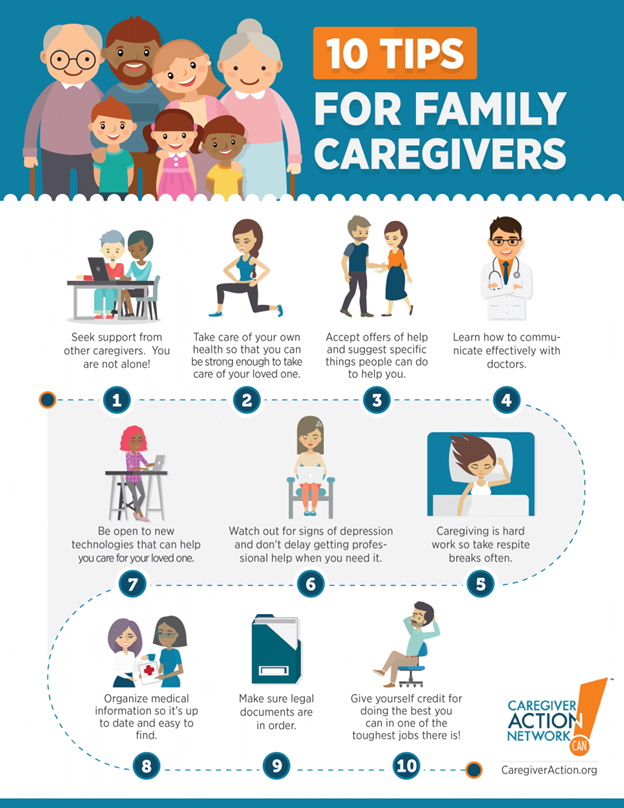Related Articles:
- How to Help Seniors Cope With the Loss of a Spouse
- Unique Approaches To Support Loved Ones With Chronic Health Conditions
- How to Talk to Your Senior Parent About Mental Health and Depression
Every day, millions of Americans step into the role of family caregiver, offering compassion, patience, and unwavering support to loved ones with chronic illnesses, disabilities, or age-related challenges. National Family Caregivers Month, observed each November, is a time to honor these silent heroes and recognize the vital role they play in our communities. From managing medications and appointments to providing emotional comfort, family caregivers embody dedication and selflessness. This month reminds us to celebrate their efforts, raise awareness of their needs, and ensure they have access to the resources, respite, and support they deserve, especially here in New Jersey and across the nation.
What Are Family Caregivers?
Family caregivers are the silent heroes who provide ongoing care, support, and advocacy for loved ones facing illness, disability, or aging challenges. They help with everyday tasks such as managing medications, scheduling appointments, assisting with mobility, and offering emotional comfort, often while balancing work, family responsibilities, and their own health.
According to the AARP and National Alliance for Caregiving, one in five Americans serves as an unpaid caregiver, dedicating countless hours each week to ensure a loved one’s well-being. While caregiving is an act of love, it can also bring significant stress, fatigue, and emotional strain. Recognizing and supporting these caregivers is essential to maintaining both family stability and community health.
What Is National Family Caregivers Month?
National Family Caregivers Month is an annual observance each November that shines a spotlight on the more than 40 million Americans serving as family caregivers. This nationwide recognition serves as both a celebration of caregivers’ compassion and a reminder of the emotional, physical, and financial challenges they often face.
According to the Administration for Community Living (ACL), the month “offers an opportunity to raise awareness of caregiving issues, educate communities, and increase support for caregivers.”
The initiative was first promoted by the Caregiver Action Network in 1994, and in 1997, President Bill Clinton issued the first presidential proclamation recognizing family caregivers. Every president since has continued the tradition, reaffirming the importance of supporting caregivers and improving access to the resources they need to thrive.
Whether providing around-the-clock care or helping with daily routines, caregivers make a lasting difference in the lives of those they support. National Family Caregivers Month offers an opportunity for all of us to thank them, learn about their experiences, and explore ways to lighten their burden through community and connection.
10 Tips for Family Caregivers
Caring for a loved one can be deeply rewarding, but it also brings emotional and physical challenges. The Caregiver Action Network recommends the following tips to help caregivers stay healthy, balanced, and supported while providing care:
- Seek support from other caregivers. You are not alone. Connect with local support groups or online communities to share experiences and advice.
- Take care of your own health. Regular exercise, nutritious meals, and rest will help you stay strong enough to care for your loved one.
- Accept offers of help. When friends or family offer assistance, say yes and suggest specific tasks they can take on.
- Communicate effectively with healthcare providers. Keep a list of questions for doctors and ask for clarification about medications or care plans.
- Take breaks often. Respite care or even a few hours away can help you recharge and prevent burnout.
- Watch for signs of depression. Seek professional support if you feel persistently sad, anxious, or overwhelmed.
- Use technology to your advantage. Apps and smart devices can help track medications, appointments, and vital signs.
- Stay organized. Keep medical records, insurance forms, and emergency contacts in one easy-to-access place.
- Review legal and financial documents. Ensure that powers of attorney, wills, and healthcare directives are up to date.
- Give yourself credit. Caregiving is one of the toughest jobs there is. Acknowledge your dedication and the difference you make every day.
For additional caregiver resources and support, visit CaregiverAction.org or call the Middlesex County Office of Aging and Disabled Services at 732-745-3295 (toll-free: 1-877-222-3737).


